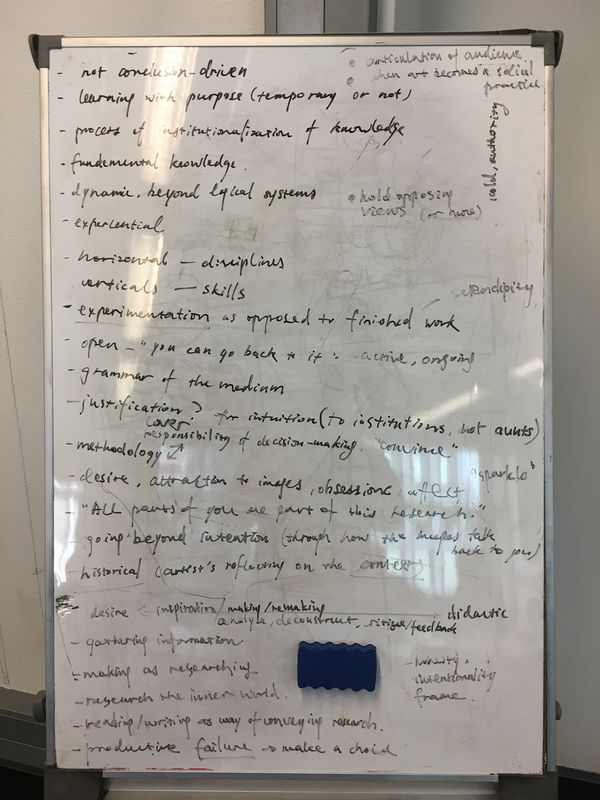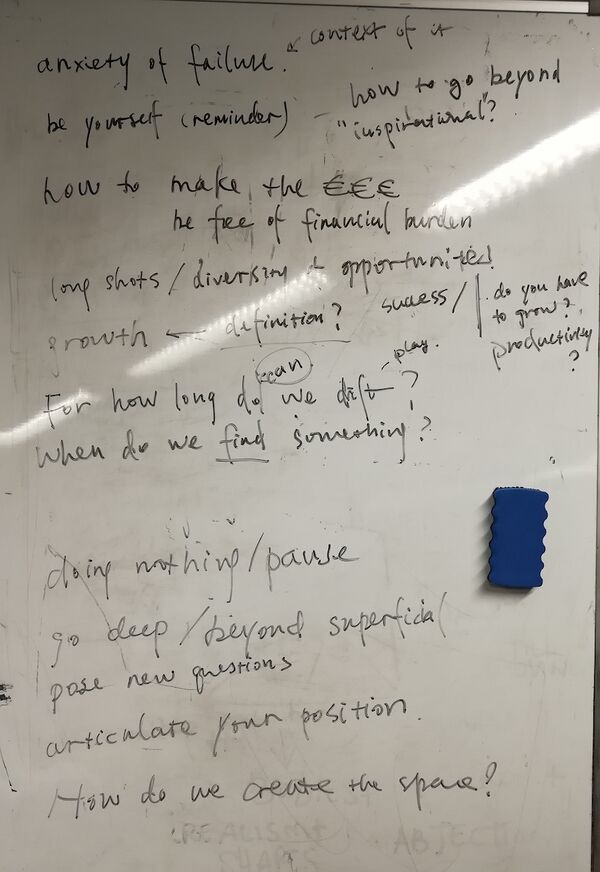Practice Based Research Focus Group 2019/2020: Difference between revisions
(Created page with "INTERROGATING 'PRACTICE BASED RESEARCH' IN THE ARTS This focus group will engage in an ongoing interrogation of the various uses of research within artistic practice. Throug...") |
mNo edit summary |
||
| (19 intermediate revisions by 4 users not shown) | |||
| Line 1: | Line 1: | ||
INTERROGATING 'PRACTICE BASED RESEARCH' IN THE ARTS | INTERROGATING 'PRACTICE BASED RESEARCH' IN THE ARTS | ||
= What is this group = | |||
This focus group will engage in an ongoing interrogation of the various uses of research within artistic practice. | This focus group will engage in an ongoing interrogation of the various uses of research within artistic practice. | ||
| Line 7: | Line 9: | ||
In our reading we will collect terms and processes that might contribute to a critical understanding 'Practice Based Research' - creating our own collective reader that might clarify this contested and often misunderstood term. | In our reading we will collect terms and processes that might contribute to a critical understanding 'Practice Based Research' - creating our own collective reader that might clarify this contested and often misunderstood term. | ||
= Sessions = | |||
== 30.9.2019 == | |||
We will read and discuss the chapter: | We will read and discuss the chapter: | ||
[[File:Thinking_J.Dunningan_RISD_The_Art_of_Critical_Making_2013.pdf]] | |||
Thingking (at RISD) | Thingking (at RISD) | ||
| Line 14: | Line 20: | ||
Essay in The Art of Critical Making Rhode Island School of Design on Creative Practice. | Essay in The Art of Critical Making Rhode Island School of Design on Creative Practice. | ||
Wiley 2013 | Wiley 2013 | ||
[[File:PBR first session.JPG | 600px]] | |||
== 02.12.2019 == | |||
The first of two sessions devoted to developing a path across 2020 trimesters for mapping out the key elements of 'practice based research'. After several sessions we have covered a number of topics including the relation between studio work and creating texts, and the relation between intellectual discourse and the emotional stakes of creative work. I would now like to make a map of reading and topics that we can collectively use to create a map for our discussions that will create path to delve into our creative processes, and explore what part of that process is usefully covered by the term 'practice-based research'. | |||
As an armature for our discussion I post a document by BRUCE MAU - A MANIFESTO FOR GROWTH - that attempts to give 40 short points - 'rules' as it were - for creative practice that leads to growth. | |||
Please read it and we'll discuss point by point on Monday. | |||
[[File:Mau.pdf]] | |||
=== Provocations/questions after discussing Bruce Mau === | |||
[[File:PBR bruce mau.jpg | 600px]] | |||
=== What's next? === | |||
==== Structure ==== | |||
We decided on a sort of '''structure''' for the focus group: | |||
- There will be a student moderator. | |||
- The outgoing moderator picks a subject for the next discussion. The incoming moderator (currently on a volunteer basis) oversees the conversation. | |||
- Repeat the structure for the next session. | |||
==== Topic for next session ==== | |||
Based on what we have discussed, Jue, the 1st moderator, picks the following subject: | |||
'''Since we talked about what growth is not, thanks to the provocations of Bruce Mau — What IS growth with regard to our own practice(s)? This is related to: what is your secret question as you make things??''' | |||
WE NEED SOMEONE TO MODERATE. Let's figure that out the week of the new term? | |||
==== Remaining notes ==== | |||
The remaining notes from the group discussion: | |||
- How do we approach these topics broadly? | |||
- Some relatively big (and somewhat specific) topics will come up in discussions. Let's acknowledge them — however we don't have to find "the one answer." These topics are: remaining independent in education, thinking about our responsibility/moral/ethics, defining growth. | |||
- Simon suggested a prompt question: What's the relationship between individual voices and the larger languages (historical, societal, etc.) they use? Do highly stable societies produce better art? | |||
Further topics for discussion: | |||
CRITICAL MAKING - RESEARCH THROUGH THE MATERIAL ACT OF MEANING. | |||
RESEARCH AS A WAY TO INFORM JUDGEMENT THAT YOU USE IN THE STUDIO | |||
STARTING POINTS : DESIRE / ATTRACTION TO IMAGES/ ANXIETY/AMBIVALENCE | |||
PSYCHOGICAL STAKES - CHOICES | |||
DESIRE TO CREATE AFFECT --- RESPONSIBLE FOR AN EFFECT OF THE VIEWER | |||
HYPER SPECIFICITY LEADS INTEGRITY OF THE WORK | |||
POWER OF IMAGES TO TALK BACK - DIALOG WITH IMAGES - MAKING WORK UNLOCKING HIDDEN LEVELS OF INSIGHT - | |||
PHYSICAL MAKING & RE-MAKING - REPETTION AS GOING BEYOND INTENTION | |||
Latest revision as of 12:14, 7 January 2020
INTERROGATING 'PRACTICE BASED RESEARCH' IN THE ARTS
What is this group
This focus group will engage in an ongoing interrogation of the various uses of research within artistic practice.
Through a series of group reading of texts - and discussion with guest tutors - we will examine the development of 'Practice Based Research' as a key term in contemporary arts practice, and take stock of the varied and often conflicting definitions of 'Practice Based Research' within contemporary arts and art education.
In our reading we will collect terms and processes that might contribute to a critical understanding 'Practice Based Research' - creating our own collective reader that might clarify this contested and often misunderstood term.
Sessions
30.9.2019
We will read and discuss the chapter:
File:Thinking J.Dunningan RISD The Art of Critical Making 2013.pdf
Thingking (at RISD) John Dunnigan Essay in The Art of Critical Making Rhode Island School of Design on Creative Practice. Wiley 2013
02.12.2019
The first of two sessions devoted to developing a path across 2020 trimesters for mapping out the key elements of 'practice based research'. After several sessions we have covered a number of topics including the relation between studio work and creating texts, and the relation between intellectual discourse and the emotional stakes of creative work. I would now like to make a map of reading and topics that we can collectively use to create a map for our discussions that will create path to delve into our creative processes, and explore what part of that process is usefully covered by the term 'practice-based research'.
As an armature for our discussion I post a document by BRUCE MAU - A MANIFESTO FOR GROWTH - that attempts to give 40 short points - 'rules' as it were - for creative practice that leads to growth.
Please read it and we'll discuss point by point on Monday.
Provocations/questions after discussing Bruce Mau
What's next?
Structure
We decided on a sort of structure for the focus group:
- There will be a student moderator.
- The outgoing moderator picks a subject for the next discussion. The incoming moderator (currently on a volunteer basis) oversees the conversation.
- Repeat the structure for the next session.
Topic for next session
Based on what we have discussed, Jue, the 1st moderator, picks the following subject:
Since we talked about what growth is not, thanks to the provocations of Bruce Mau — What IS growth with regard to our own practice(s)? This is related to: what is your secret question as you make things??
WE NEED SOMEONE TO MODERATE. Let's figure that out the week of the new term?
Remaining notes
The remaining notes from the group discussion:
- How do we approach these topics broadly?
- Some relatively big (and somewhat specific) topics will come up in discussions. Let's acknowledge them — however we don't have to find "the one answer." These topics are: remaining independent in education, thinking about our responsibility/moral/ethics, defining growth.
- Simon suggested a prompt question: What's the relationship between individual voices and the larger languages (historical, societal, etc.) they use? Do highly stable societies produce better art?
Further topics for discussion:
CRITICAL MAKING - RESEARCH THROUGH THE MATERIAL ACT OF MEANING. RESEARCH AS A WAY TO INFORM JUDGEMENT THAT YOU USE IN THE STUDIO
STARTING POINTS : DESIRE / ATTRACTION TO IMAGES/ ANXIETY/AMBIVALENCE PSYCHOGICAL STAKES - CHOICES DESIRE TO CREATE AFFECT --- RESPONSIBLE FOR AN EFFECT OF THE VIEWER
HYPER SPECIFICITY LEADS INTEGRITY OF THE WORK POWER OF IMAGES TO TALK BACK - DIALOG WITH IMAGES - MAKING WORK UNLOCKING HIDDEN LEVELS OF INSIGHT -
PHYSICAL MAKING & RE-MAKING - REPETTION AS GOING BEYOND INTENTION


